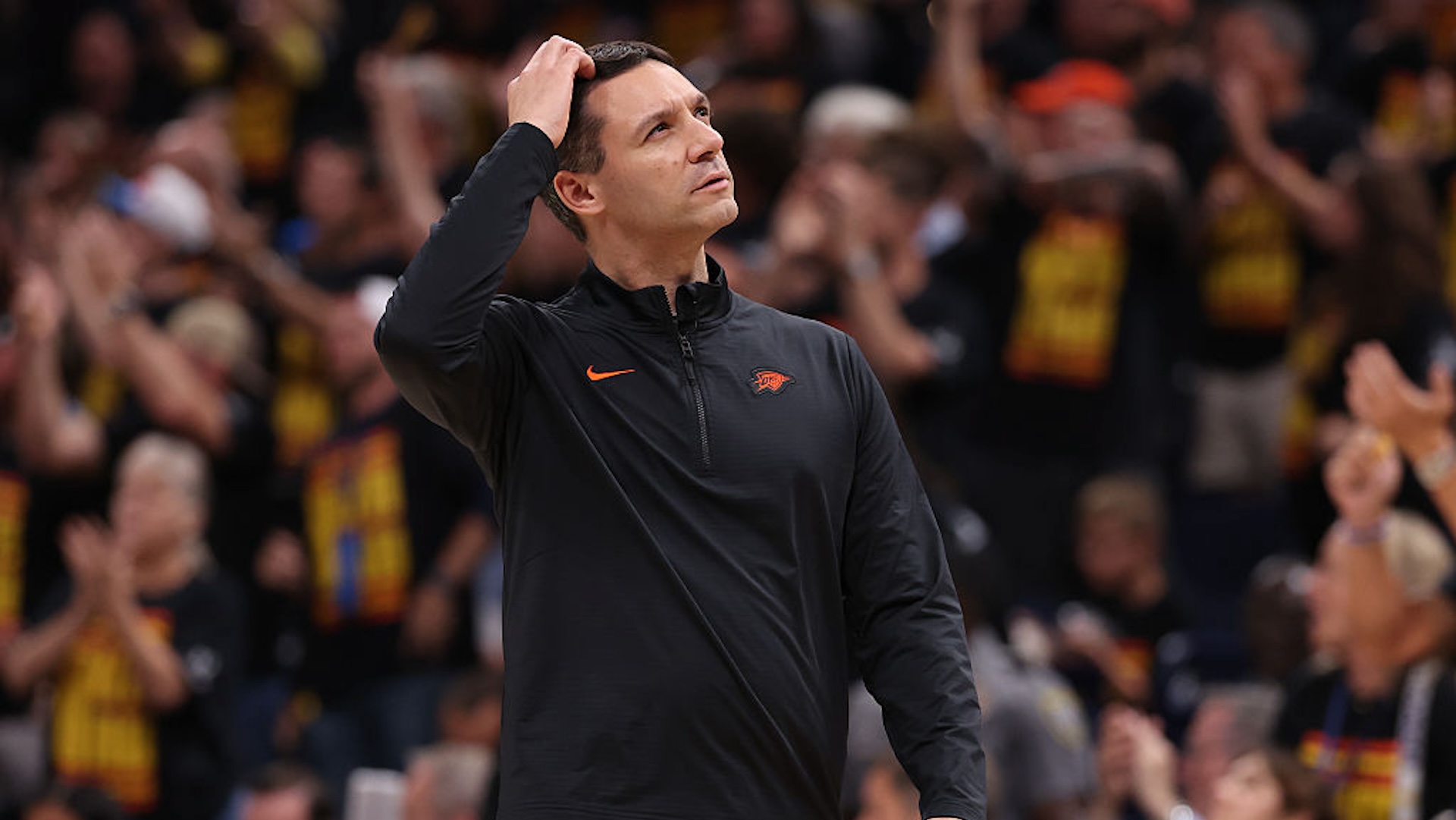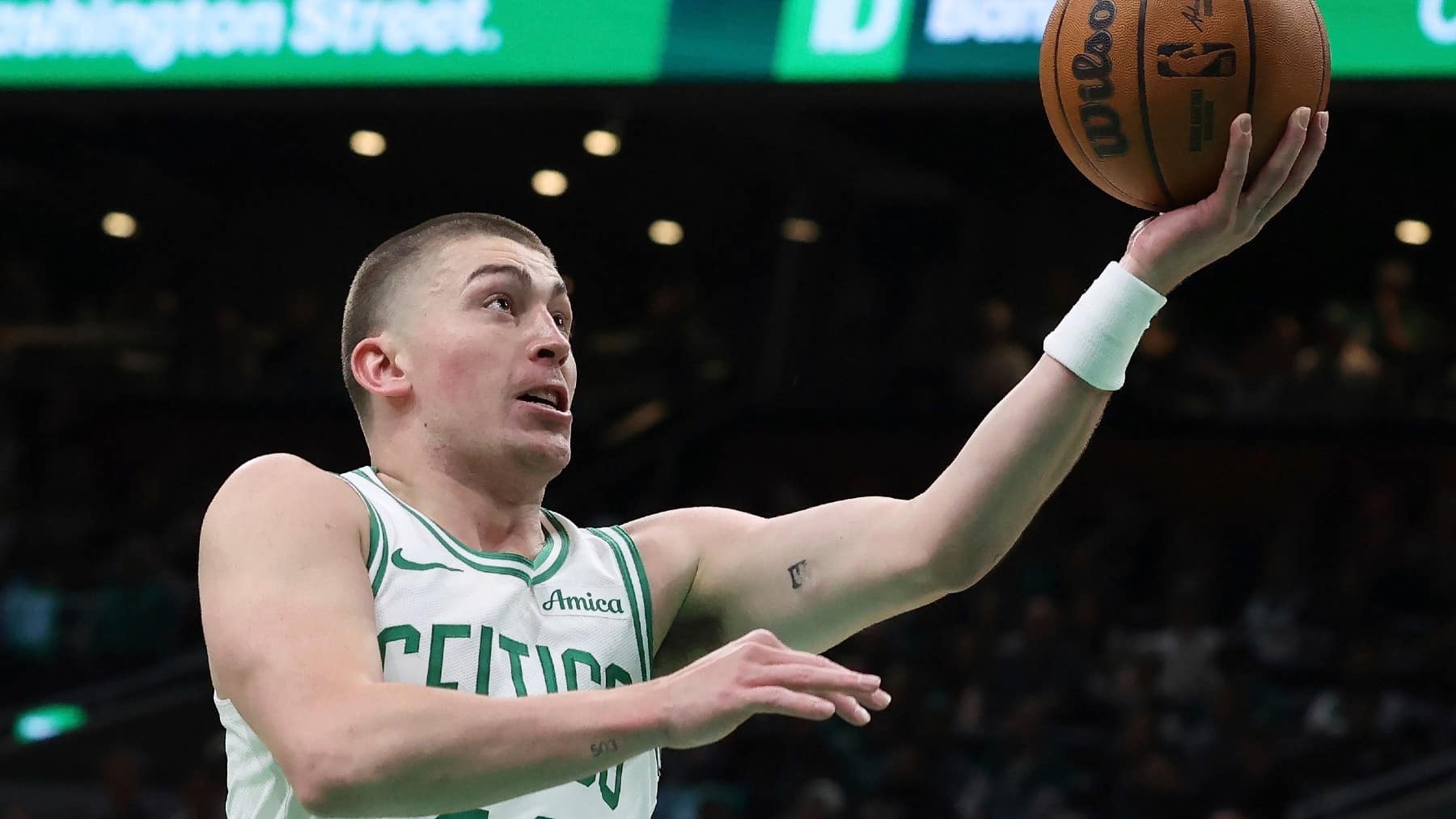
Hypothetical: You are an NBA head coach and your team is leading a playoff game by three points with 11.1 seconds to go. The opposing team is getting ready to inbound the ball from under their own basket, they have no timeouts, and their best player is stuck on the bench. Do you foul and send them to the line, or trust your ferocious defenders—I forgot to mention that you have the best defense in the league—to get set and deal with what will surely be a semi-panicked attempt to fling up a potential game-tying shot? If you’re Thunder head coach Mark Daigneault, you choose to lose the game.
It is always cruel and simplistic to hang a bad result on one play, decision, or even set of decisions, but Daigneault cannot be spared the hot light of scrutiny after he and the Thunder fumbled away Game 1 of their second-round series against the Denver Nuggets. The Thunder were up 11 with 4:31 left to play, and seemed ready to put away a game that they had led and dominated all night. A shocking 12-2 Nuggets run made it 115-114 with 1:07 to play, which is about when the bad decisions started being made. The teams traded misses on the next two possessions, and Shai Gilgeous-Alexander ended up at the line with 14 seconds left. He hit both free throws to put the Thunder up by three.
Here we will pause to acknowledge that “Should you foul while up three at the end of the game?” is a question that is routinely debated inside and outside the NBA. At the risk of oversimplifying things, there is a type of coach, analyst, and fan who holds a zealous belief that fouling in such a scenario is the best way to protect a three-point lead. These guys consider themselves to be the Thinking Men Of Basketball, and they all look like Mark Daigneault.
Denver called their last timeout to advance the ball to half court. Nikola Jokic was fouled the split-second the ball was inbounded, sending him to the line with 13 seconds left. Jokic hit both freebies, and then was removed from the game to protect him from a sixth foul following an OKC timeout. Here is where the Thunder seemingly killed off the Nuggets for good: A perfectly designed play sprung Gilgeous-Alexander for a dunk off the inbound pass, leaving the Nuggets with 1) the ball and 11 seconds left to play 2) no timeout to advance the ball or draw up a play 3) Jokic on the bench. And yet, instead of daring the Nuggets to run a scramble offense for one last shot, Daigneault had his team foul Aaron Gordon immediately. He went to the line and hit both shots. OKC called its last timeout, and the Nuggets fouled Chet Holmgren on the inbound. Holmgren missed both free throws, Christian Braun rebounded the ball with nine seconds left, zipped it to Russell Westbrook on the wing, who found Gordon behind the three-point line, who hit the game-winning three. The buzzer sounded as OKC threw up a last-ditch heave, and the game ended, 121-118, in favor of the Nuggets.
[embedded content]
Time was ultimately the thing that doomed the Thunder. The point of fouling while up three is to turn the screw on the other team, to make them crawl through the end of the game without a clean look at a game-tying shot while precious seconds and timeouts and opportunities to exert some control over the proceedings slip away. Daigneault’s error wasn’t so much fouling up three, but fouling up three so quickly. When ball was inbounded to Gordon with 10.7 seconds left, he had about 60 feet and a set defense between him and anything resembling a clean look at the rim. The Thunder could have tried trapping him in the backcourt to cleave some more seconds off the clock, or at the very least could have made him cross half court before fouling him. What they did instead was essentially allow the Nuggets to time travel into a more advantageous future. By the time Braun rebounded Holmgren’s second miss, only two seconds had ticked off the game clock, and the well-positioned defense that Gordon had been facing one possession earlier was replaced by one that was scrambling to get back.
Daigneault told reporters after the game that he didn’t think fouling up three was the reason the Thunder lost the game, though he did acknowledge that their timing was poor. “The fouling up three, that’s on me,” he said. “I think giving the foul and getting the foul executed is critical, so if there’s something to be learned from that it’s probably giving it too early on my part.”
Coaches like Daigneault often get credit for how obsessively they cling to the game’s finer details and find advantages in the margins. Daigneault is inarguably a good coach, and it there is still every possibility that his team is going to rampage its way to the NBA Finals. But for at least one game he demonstrated that it’s possible to get lost in those margins. When Gordon’s shot went in, I couldn’t help but think of a game the Thunder and Nuggets played in March. During that game, Daigneault debuted and then later proudly talked up his “permanent sub” strategy. In the first quarter, he sent bench scrub Dillon Jones to the scorer’s table, as if he was going to check into the game. The idea was to force the referees to briefly stop the game to see if Jones was ready to enter during every dead ball situation, which would prevent Jokic from quickly inbounding the ball as he prefers to do. Daigneault’s plan was to just keep declining to send Jones into the game while still forcing the refs to slow things down. He was hit with a delay of game penalty, and the Thunder lost the game 140-127

